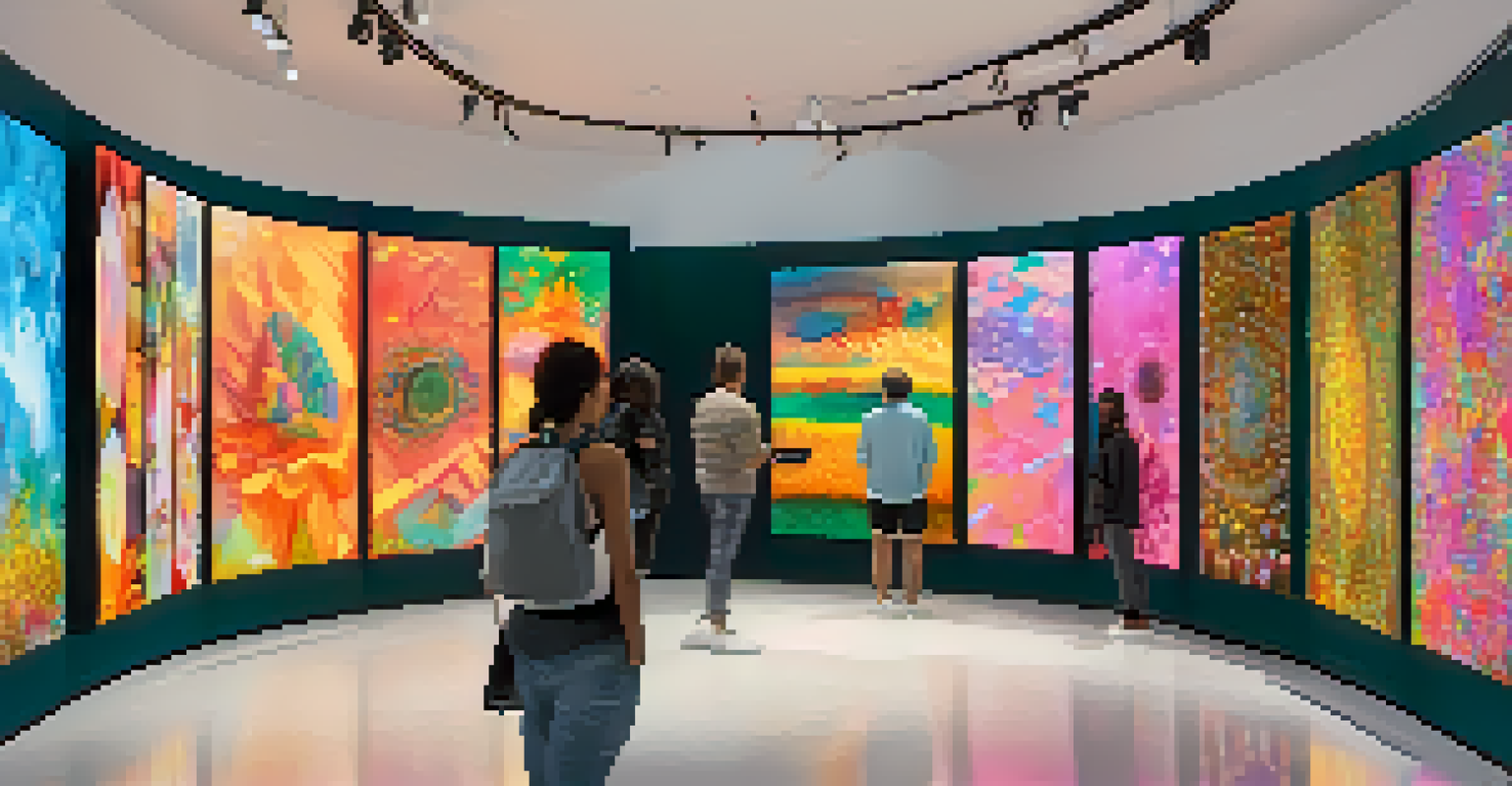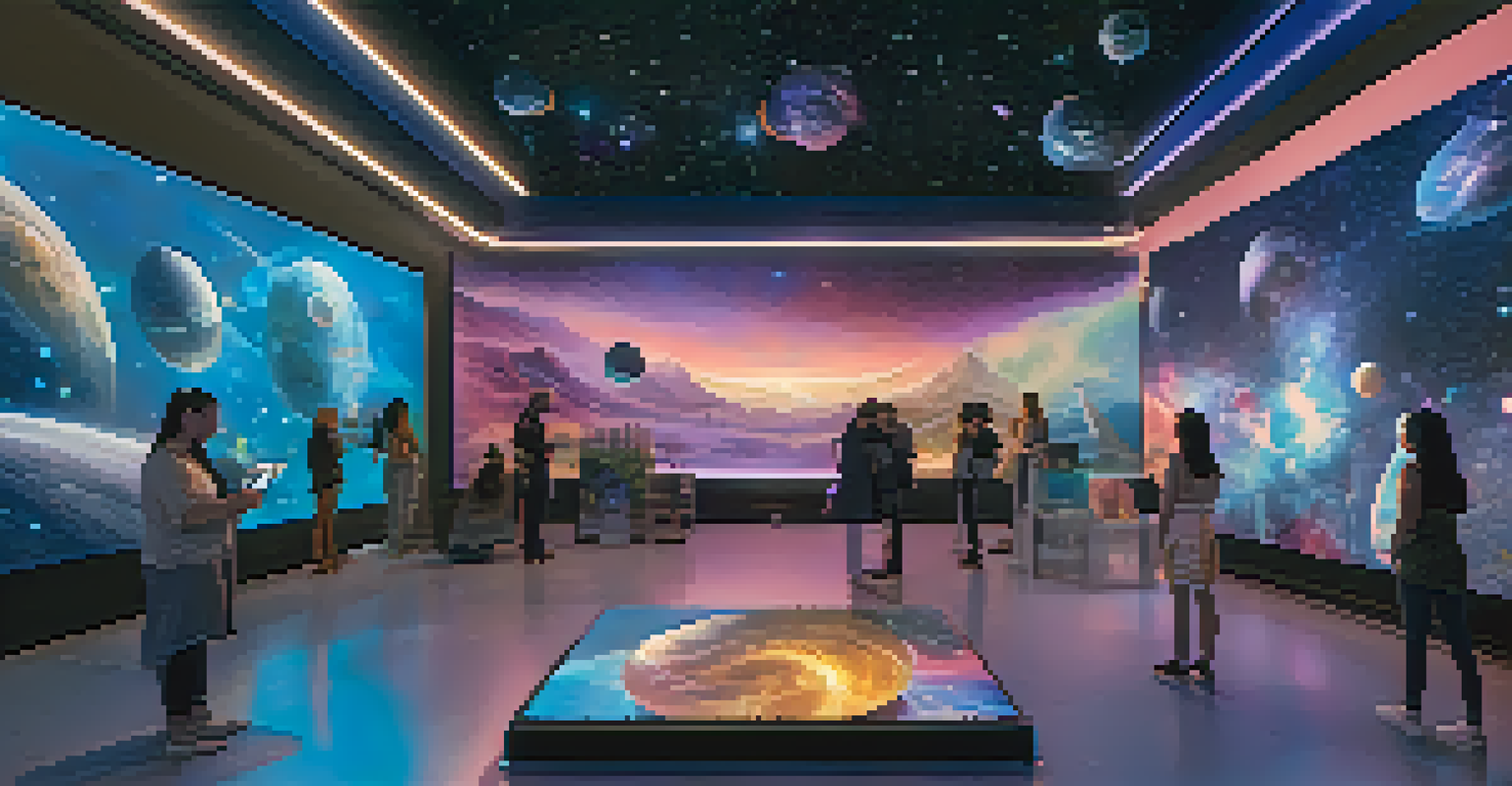The Role of Identity in NFT Collecting and Ownership Dynamics

Understanding NFTs and Their Unique Identity
Non-fungible tokens, or NFTs, represent unique digital assets on the blockchain. Unlike cryptocurrencies, which are interchangeable, each NFT has distinct properties that confer ownership of a specific digital item, be it art, music, or virtual real estate. This uniqueness can be likened to owning a rare collectible, such as a signed baseball card, where the value is tied closely to its individuality.
Art is the most beautiful of all lies; it is a way of recognizing oneself in the other.
This intrinsic uniqueness of NFTs means that identity plays a crucial role in their collecting and ownership dynamics. Collectors often seek to build a portfolio that reflects not just financial investment but also personal taste and values. For many, the identity tied to their NFT collection becomes a form of self-expression, akin to curating a gallery of their favorite art pieces.
As the NFT market evolves, understanding how identity influences ownership will become increasingly important. The interplay between personal identity and digital ownership shapes not only individual experiences but also broader community dynamics within the NFT space.
The Impact of Personal Identity on NFT Choices
Personal identity encompasses various factors, including cultural background, interests, and social connections. These elements significantly influence which NFTs individuals choose to collect. For instance, an artist may gravitate towards NFTs that resonate with their own style or cultural heritage, while a music lover might focus on collecting exclusive tracks or concert memorabilia.

Moreover, personal identity can foster connections within the NFT community. When collectors share similar backgrounds or interests, they often form groups that celebrate specific types of NFTs, creating a sense of belonging. This social aspect highlights how personal identity not only shapes individual choices but also influences collective trends in the NFT market.
Identity Shapes NFT Collecting
Personal and cultural identities significantly influence the choices collectors make in the NFT market.
Ultimately, the decisions we make in NFT collecting often reflect deeper parts of ourselves. As individuals navigate this new digital landscape, their choices serve as a canvas for expressing who they are and what they value.
Cultural Identity and Its Influence on NFT Collecting
Cultural identity plays a significant role in how individuals engage with NFTs. Different cultures have unique artistic expressions, storytelling methods, and values that inform what they find appealing in digital collectibles. For instance, Indigenous artists may create NFTs that represent their heritage, allowing collectors to engage with and support cultural narratives.
Identity is the essence of who we are, and expressing that through art is the ultimate form of freedom.
This cultural connection not only enriches the personal experience for collectors but also raises awareness about diverse voices within the NFT space. By purchasing NFTs that celebrate cultural identity, collectors help preserve and promote these narratives in a digital format, contributing to a broader understanding of global art and culture.
As NFTs continue to proliferate, the intersection of cultural identity and digital ownership will likely gain prominence. Collectors often seek to invest in NFTs that resonate culturally, creating an ecosystem that supports and honors a variety of identities.
The Role of Social Identity in NFT Communities
Social identity refers to the way individuals categorize themselves within various social groups. In the realm of NFTs, this can manifest in many ways, such as being part of a specific collector group or following a particular artist. These affiliations often shape the types of NFTs individuals choose to buy and trade, as social dynamics can create trends and influence market demands.
Additionally, social identity can affect how collectors present themselves within the NFT space. Many individuals curate their online personas to reflect their interests in specific NFT collections, sharing their purchases and experiences on social media. This not only strengthens community bonds but also elevates the visibility of particular artists and collections, driving further interest.
Social Connections Enhance Community
Social identity fosters connections among collectors, creating vibrant communities that drive trends and interests.
Ultimately, social identity fuels a sense of camaraderie among collectors, fostering a vibrant community rooted in shared interests. As this community continues to grow, the influence of social dynamics on NFT ownership will likely become even more pronounced.
The Intersection of Identity and Brand Ownership in NFTs
Brands are increasingly entering the NFT space, creating new dynamics between brand identity and consumer ownership. When consumers purchase branded NFTs, they often feel a deeper connection to the brand, intertwining their personal identity with the brand's narrative. This relationship can enhance brand loyalty, as collectors feel they are part of something larger than themselves.
For example, when a fashion brand releases a limited-edition NFT collection, consumers may view this as an opportunity to showcase their style while also supporting the brand they love. This blend of personal and brand identity creates a unique ownership experience that transcends traditional consumerism, turning collectors into brand ambassadors.
As brands continue to explore the NFT landscape, understanding this intersection of identity and ownership will be crucial. Brands that successfully resonate with their audience's identities will likely thrive in the competitive NFT market.
Identity and the Future of NFT Collecting
As the NFT landscape evolves, the role of identity in collecting will only become more significant. Emerging technologies and platforms will likely enhance how individuals express their identities through digital assets. For instance, virtual reality spaces may allow collectors to showcase their NFTs in personalized galleries, further emphasizing the connection between identity and ownership.
Moreover, as more artists and communities enter the NFT space, diverse identities will continue to shape the types of NFTs available. This growth will create opportunities for new narratives and expressions, making the NFT market even richer and more inclusive. Collectors will have the chance to explore a wider array of identities through their collections.
Challenges of Digital Ownership
While identity enriches NFT ownership, challenges like digital theft and trend pressure can complicate the collecting experience.
The future of NFT collecting promises to be a dynamic interplay of identity, creativity, and technology. As individuals continue to navigate this digital frontier, the ways we understand and express our identities will undoubtedly influence the trajectory of the NFT market.
Challenges of Identity in NFT Ownership
While the connection between identity and NFT ownership brings many benefits, it also presents challenges. Issues such as digital identity theft and fraud can undermine the authenticity of ownership, leading to distrust among collectors. As individuals invest in NFTs that reflect their identities, they must also be vigilant about protecting their digital assets.
Additionally, the rapid pace of the NFT market can create pressure to conform to certain trends, potentially diluting personal identity. Collectors may feel compelled to acquire popular NFTs that don’t truly resonate with them, leading to a collection that lacks personal significance. This tension between community influence and personal choice is a nuanced aspect of the NFT experience.

Navigating these challenges will require a balance between embracing community connections and maintaining individual authenticity. As the NFT space continues to mature, addressing these challenges will be essential for fostering a healthy and vibrant collecting culture.